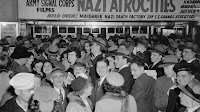In the 1930s, Hollywood studios gave the German counsel veto power over prospective scripts to preserve access to a lucrative international market. Businessmen like Henry Ford lobbied to maintain friendly relations with the National Socialist regime, to protect his business interests in the country. Does any of this sound familiar to contemporary viewers? Yet, co-directors Ken Burns, Lynn Novick, or Sarah Botstein, never draw any parallels to the Xinjiang genocide, which their PBS brethren at Frontline described as “the largest mass incarceration of an ethnic group since the Holocaust.” That silence is deafening in their new three-part documentary analyzing American silence, The U.S. and the Holocaust, which premieres Sunday on PBS.
Frankly, many viewers might be surprised to hear in the first episode that an estimated one million Americans protested Hitler and his anti-Semitic policies in the 1930s. Unfortunately, politicians were reluctant to take any kind of stand against the Axis or to aid the Allies—especially European refugees (whom were predominantly Jewish).
Burns and company largely associate the neutrality movement with anti-Semitism, which is surely partly true. However, the talking heads never mention the US Communist Party (which was at its peak of influence in the 1930s) relentlessly campaigned against American involvement in the War, until Hitler violated the Molotov-Ribbentrop Pact. More fundamentally, nobody really acknowledges how fresh memories the horrors of WWI were for Americans at this time. Still, there is no denying the ugly effectiveness of demagogues like Lindbergh and Coughlin.
Throughout the docuseries, the filmmakers and commentators contort themselves into pretzels to not judge FDR too harshly. However, Assistant Secretary of State Breckinridge Long emerges (deservedly so) as the chosen villain of the narrative, for his determined efforts to prevent humanitarian immigration and delay relief efforts the victims of the German regime. If nothing else, they successfully make their case against him.
To give credit where its due, Burns et al do acknowledge those who tried to do the right thing, including American rescuer Varian Fry. William Hurt portrayed Fry in Lionel Chetwynd’s cable film Varian’s War, but he still has yet to receive the acclaim he deserves. However, the preponderance of the allotted time is devoted to indicting America’s failures to live up to its ideals.
Yet, the best analysis is that which explores thorny ethical grey areas, like whether the Allies should have bombed concentration camps, potentially killing interned prisoners in the process. Not surprisingly, Burns, Novick, and Botstein draw parallels to the January 6th Capitol riot and Trumpism, but there is real, internationally recognized genocide going on today in Xinjiang that USATH silently ignores. Forty years from now, this production might find an ironic place in a PBS documentary titled The U.S. and Xinjiang. That is very disappointing for those of us desperately hoping America will apply lessons learned during the Holocaust.
There is still some decent history in The U.S. and the Holocaust, but Daniel Anker much more thoroughly documents the see-no-evil response of the old Hollywood studios in Imaginary Witness: Hollywood and the Holocaust. Too partisan and yet too timid, The U.S. and the Holocaust airs this Sunday, Monday, and Tuesday (9/18-9/20) on PBS.

